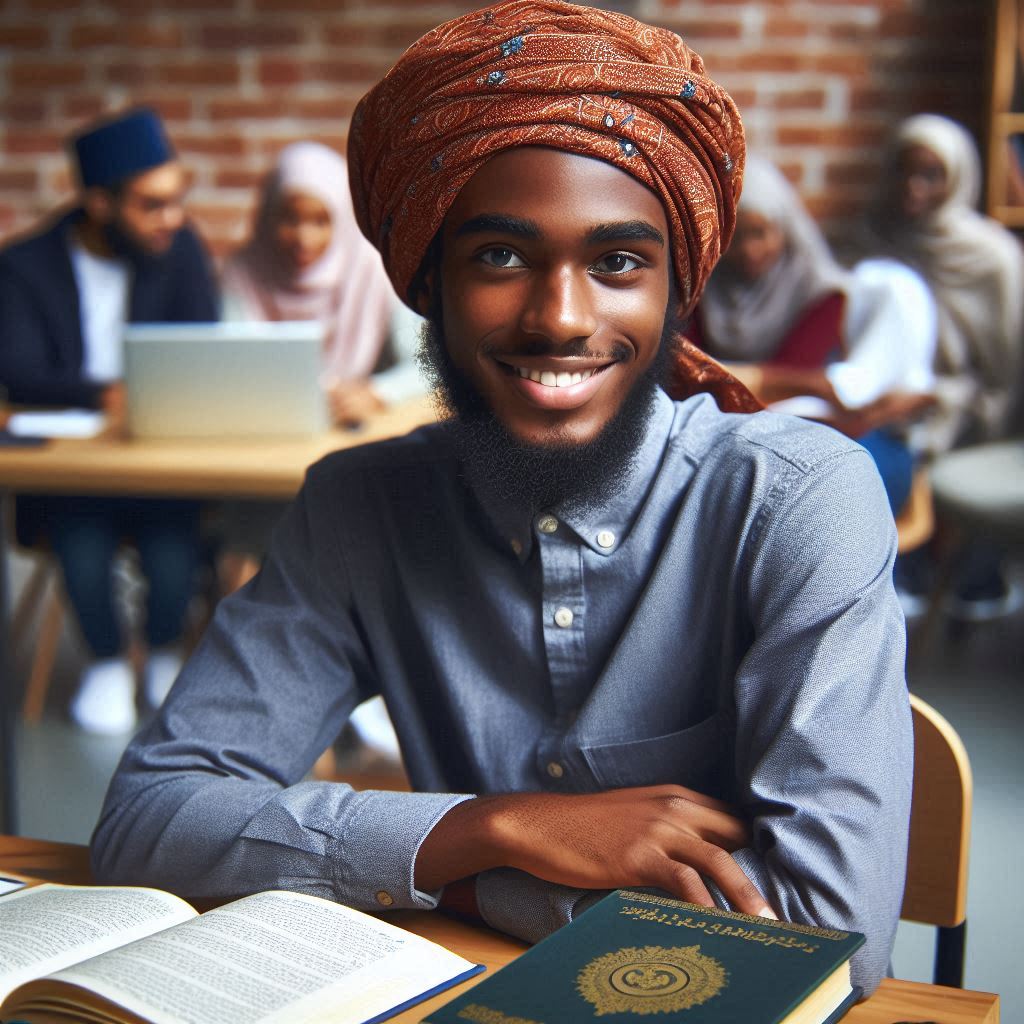Introduction
In the dynamic landscape of Nigerian secondary education, the inclusion of Religious Studies stands as a cornerstone of academic curriculum.
Far beyond mere instruction in doctrine, this subject serves as a beacon illuminating the path to tolerance, understanding, and societal cohesion.
Religious Studies uniquely enriches education, offering insights into diverse beliefs, cultural practices, and moral philosophies.
Its presence underscores the recognition of religion as a fundamental aspect of human identity and societal development.
Through the study of various faith traditions, students gain insights into the historical, ethical, and philosophical dimensions that shape human experience.
At its core, Religious Studies serves as a bridge connecting individuals from disparate backgrounds.
By fostering an environment of mutual respect and curiosity, it cultivates empathy and understanding among students of different faiths.
In a country as ethnically and religiously diverse as Nigeria, this understanding is paramount to fostering social harmony and national unity.
Moreover, Religious Studies provides a platform for critical engagement with complex moral and ethical issues.
Through dialogue and reflection, students develop the capacity to navigate the complexities of modern life with compassion and integrity.
Religious teachings emphasize ethical principles, which cultivate responsibility towards others and the world.
History of Religious Studies in Nigerian Secondary Schools
Religious Studies in Nigerian secondary education has traversed a rich historical tapestry, reflecting the country’s diverse cultural and religious landscape.
The curriculum began by promoting religious tolerance. It evolved to foster understanding. Now, it aims for appreciation among students.
Overview of how religious studies has evolved in the Nigerian educational system
The journey of Religious Studies in Nigerian secondary schools began with a recognition of the importance of religion in society.
In the early years, the curriculum primarily focused on Christianity and Islam, the two dominant religions in Nigeria.
The nation embraced its multicultural identity and expanded the curriculum to include various faiths. It added Traditional African Religion, Hinduism, and Buddhism.
Over the years, various curriculums have been implemented to cater to the diverse religious demographics of the country.
These curriculums have evolved to reflect changes in societal attitudes, educational philosophies, and religious dynamics.
Initially, educators taught Religious Studies as a standalone subject. Later, they integrated it into Civic Education. This integration promotes holistic citizenship understanding and religious pluralism.
The different religious studies curriculums that have been implemented over the years
The curriculum has also adapted to address contemporary issues and challenges facing Nigerian society.
Modules on ethics, morality, and social justice have been incorporated to instill values of empathy, respect, and tolerance among students.
Furthermore, efforts have been made to promote interfaith dialogue and understanding, fostering unity amidst religious diversity.
Despite these advancements, challenges persist in the teaching of Religious Studies in Nigerian secondary schools.
Issues such as curriculum standardization, teacher training, and religious bias remain areas of concern.
Additionally, debates surrounding the role of religion in education continue to shape the landscape of Religious Studies in the country.
Therefore, the history of Religious Studies in Nigerian secondary education is a testament to the nation’s commitment to fostering religious harmony and understanding.
As Nigeria evolves, its approach to teaching Religious Studies adapts. This equips future generations with skills for a diverse society.
Read: Nigerian Film Industry: Growth and Challenges
Current State of Religious Studies in Nigerian Secondary Schools
In the landscape of Nigerian secondary education, Religious Studies stands as a cornerstone, shaping the moral and ethical compass of students.
Examining the current state of this discipline unveils its profound influence on the holistic development of young minds.
The current religious studies curriculum in Nigerian secondary schools
The curriculum of Religious Studies in Nigerian secondary schools reflects the nation’s rich religious diversity, encompassing Christianity, Islam, and indigenous beliefs.
However, amidst this diversity lies a need for a more comprehensive approach.
While the syllabus provides insights into religious doctrines and practices, there’s a growing call for a curriculum that fosters critical thinking and interfaith dialogue.
The impact of religious studies on students’ moral and ethical development
The impact of Religious Studies on students’ moral and ethical development cannot be overstated.
Beyond imparting knowledge of religious tenets, it cultivates virtues such as empathy, compassion, and respect for others’ beliefs.
By engaging with ethical dilemmas and exploring the universal principles underlying different faiths, students develop a deeper understanding of morality and ethical decision-making.
Moreover, Religious Studies serves as a catalyst for social cohesion and conflict resolution in a culturally diverse society like Nigeria.
By promoting tolerance and understanding, it lays the groundwork for peaceful coexistence amidst religious differences.
Yet, challenges persist. The quality of Religious Studies instruction varies across schools, with some lacking trained teachers and adequate resources.
The curriculum often emphasizes rote learning, which hinders students from developing critical thinking skills. This prevents them from applying ethical principles to real-world scenarios.
Transform Your Career with Expert Guidance
Get personalized mentorship consulting that’s tailored to your unique path. Our expert advice is actionable and exclusive.
Get StartedTo address these challenges and maximize the potential of Religious Studies in shaping students’ moral integrity, reforms are imperative.
A revamped curriculum should prioritize experiential learning, encouraging students to engage in dialogue, community service, and ethical reflection.
Furthermore, teacher training programs should emphasize pedagogical approaches that foster critical thinking and empathy.
In review, Religious Studies occupies a pivotal role in Nigerian secondary education, molding students into morally upright individuals capable of navigating the complexities of the modern world.
Nigeria can harness the full potential of Religious Studies by reimagining the curriculum and investing in teacher training. This approach will cultivate a generation grounded in ethical values and interfaith harmony.
Read: Impact of Social Media on Nigerian Arts

Challenges Faced in Teaching Religious Studies in Nigeria
In the mosaic of Nigerian education, teaching Religious Studies stands as a cornerstone.
Yet, within this realm lies a labyrinth of challenges that educators navigate daily.
From the intricate tapestry of religious diversity to the scarcity of resources and the looming shadow of political interference, the journey of teaching Religious Studies in Nigeria is fraught with hurdles.
The challenges faced by educators in teaching religious studies
At the heart of the challenge lies Nigeria’s kaleidoscopic religious landscape.
With a rich tapestry of faiths including Christianity, Islam, traditional African religions, and burgeoning sects, educators must delicately balance inclusivity while navigating the nuances of each belief system.
This demands not only a deep understanding of these faiths but also a commitment to fostering respect and harmony among students.
Compounding this challenge is the dearth of resources.
In a country grappling with economic constraints, classrooms often lack adequate textbooks, teaching materials, and technological resources essential for effective instruction.
This scarcity not only hampers educators’ ability to provide quality education but also exacerbates existing disparities between urban and rural schools.
Addressing issues such as religious diversity, lack of resources, and political interference
However, perhaps the most formidable challenge arises from political interference.
Nigeria’s complex socio-political landscape often casts a long shadow over the realm of education, and Religious Studies is no exception.
Political agendas may influence curriculum content, leading to biased narratives or the marginalization of certain faiths.
Moreover, the politicization of religious identity can exacerbate tensions among students, hindering open dialogue and mutual understanding.
Despite these challenges, educators in Nigeria’s Religious Studies classrooms display unwavering resilience.
They use innovative teaching methods and collaborative initiatives to foster interfaith dialogue and transcend barriers. They commit to cultivating a generation of enlightened citizens.
Yet, true progress requires systemic change.
Policymakers must prioritize education, allocating resources equitably and safeguarding the integrity of academic discourse from political influence.
Moreover, fostering interfaith dialogue and promoting religious tolerance must be enshrined in both curriculum and national ethos.
In the labyrinth of challenges faced in teaching Religious Studies in Nigeria, educators stand as beacons of hope, illuminating the path towards a more inclusive, enlightened society.
It is through their dedication and perseverance that the tapestry of Nigeria’s religious diversity can be celebrated, rather than seen as a barrier.
Read: How to Start a Career in Nigerian Performing Arts
Discover More: Integration of Nigerian Languages in Digital Platforms
Explore Further: The Evolution of Nigerian Television Production
Find Out More: Funding and Grants for Nigerian Fashion Startups
Gain More Insights: Interfaith Dialogue in Islamic Studies Nigeria
Role of Religious Studies in Promoting Peace and Unity in Nigeria
How religious studies can contribute to promoting peace and unity among diverse religious communities
Religious Studies in Nigerian secondary education play a pivotal role in fostering peace and unity among diverse religious communities.
In a country as culturally rich and religiously diverse as Nigeria, where Christianity, Islam, and traditional African religions coexist, understanding and respecting each other’s beliefs are paramount for national harmony.
Religious Studies curriculum provides a platform for students to explore the commonalities and differences among religions.
By delving into the teachings, rituals, and histories of various faith traditions, students develop empathy and respect for the beliefs of others.
This understanding serves as a foundation for promoting tolerance and acceptance in society.
Interfaith dialogue is a cornerstone of promoting peace and unity, and Religious Studies classes provide a safe space for such discussions.
Through facilitated conversations and debates, students learn to appreciate the perspectives of different religious groups.
They discover that despite theological disparities, the fundamental values of compassion, kindness, and justice are shared across religions.
Case studies or examples of how religious studies has helped foster interfaith dialogue and understanding
Case studies illustrate the tangible impact of Religious Studies on fostering interfaith understanding.
In Kaduna, a region historically plagued by religious conflicts, schools have implemented comprehensive Religious Studies programs.
These initiatives have led to improved relations between Christian and Muslim students.
By learning about each other’s faith traditions, stereotypes and prejudices are debunked, paving the way for mutual respect and cooperation.
In Jos, where religious tensions have simmered for years, schools have introduced extracurricular activities like interfaith prayer sessions and community service projects.
These initiatives have created bonds of friendship among students from different religious backgrounds, breaking down barriers and fostering a sense of unity.
Moreover, Religious Studies equips students with critical thinking skills to analyze religious texts and discern between fundamental teachings and cultural interpretations.
This empowers them to resist extremist ideologies that seek to divide communities along religious lines.
Basically, Religious Studies in Nigerian secondary education plays a vital role in promoting peace and unity.
By fostering interfaith dialogue, dispelling stereotypes, and cultivating empathy, Religious Studies contribute to building a more harmonious and inclusive society where diversity is celebrated, not feared.
As Nigeria continues on its path towards national cohesion, investing in Religious Studies remains essential for a brighter, more peaceful future.
Read: Famous Nigerian Dance Groups and Choreographers
Find Out More: Colonial Archives and Research Resources in Nigeria
Explore Further: How to Build a Portfolio in Fine and Applied Art
Gain More Insights: Top Beauty Products Recommended by Nigerian Experts
Strategies for Improving the Teaching of Religious Studies in Nigerian Secondary Education
Suggestions for enhancing the teaching of religious studies in Nigerian secondary schools
- Implement practical teaching methods: Incorporate experiential learning activities to make lessons more engaging and relevant to students.
- Integrate technology: Use multimedia resources and online platforms to supplement traditional teaching methods and enhance students’ understanding.
- Encourage critical thinking: Foster a classroom environment where students are encouraged to ask questions, analyze and evaluate information critically.
- Provide teacher training: Offer professional development opportunities to help teachers improve their knowledge and teaching strategies in religious studies.
- Promote cultural awareness: Highlight the diverse religious beliefs and practices in Nigeria to promote tolerance, understanding, and respect among students.
- Foster community engagement: Organize school events, seminars, and field trips to religious sites to create opportunities for students to interact with practitioners and deepen their understanding.
Recommendations for curriculum reform, teacher training, and community engagement
- Update the curriculum: Revise the religious studies curriculum to reflect current trends, issues, and developments in the field.
- Include practical components: Add practical components such as community service projects, study tours, and internships to help students apply theoretical knowledge in real-life scenarios.
- Support teacher professional development: Provide ongoing training, workshops, and resources for teachers to enhance their pedagogical skills and subject knowledge.
- Promote parental involvement: Engage parents in school activities, discussions, and events related to religious studies to foster a collaborative learning environment.
- Collaborate with religious organizations: Partner with local religious groups and leaders to provide students with firsthand experiences and insights into different belief systems.
- Evaluate and monitor progress: Establish mechanisms for evaluating the effectiveness of teaching strategies, curriculum changes, and community engagement initiatives to ensure continuous improvement.
By implementing these strategies and recommendations, Nigerian secondary schools can enhance the teaching of religious studies, promote cultural understanding, and prepare students to be informed and respectful global citizens.
You Might Also Like: Technology’s Role in Preserving Nigerian Languages
Conclusion
Lastly, the importance of religious studies in Nigerian secondary education cannot be overstated.
It serves as a foundation for moral and ethical development.
Stakeholders, including policymakers, educators, and parents, must prioritize religious studies to promote values like tolerance and respect in society.
By emphasizing religious studies in secondary education, Nigeria can foster a culture of understanding and unity among its diverse population.
In summary, incorporating religious studies into the curriculum is crucial for shaping responsible and compassionate individuals who contribute positively to society.
It is imperative that all stakeholders work together to ensure that religious studies are given the attention and resources they deserve in Nigerian secondary education.
Let us come together to prioritize religious studies in Nigerian secondary education for the holistic development of our youth and the betterment of society as a whole.




